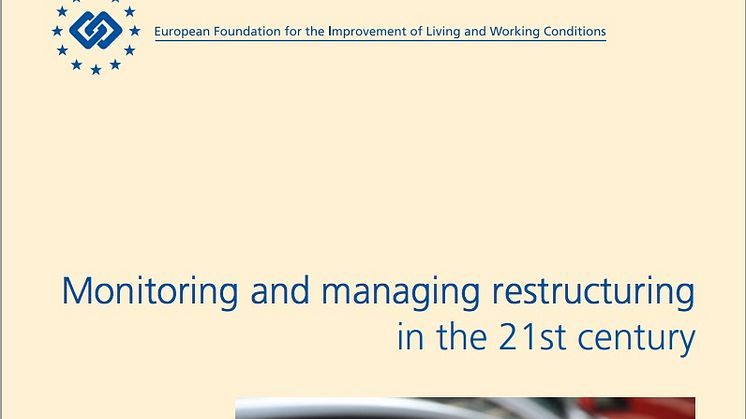
Press release -
The economic crisis has significantly reduced the rate of offshoring in Europe
(Dublin, Ireland): The economic crisis has significantly reduced the rate of offshoring in Europe, according to the 2013 annual report of the European Restructuring Monitor (ERM) - Monitoring and managing restructuring in the 21st century. The report, which is launched at a high-level EU-Japan tripartite meeting on employment and social issues in Tokyo today, found that the offshoring share of restructuring job loss in Europe peaked before the 2008–2009 crisis and has remained lower ever since. The report also presents a retrospective of over a decade of monitoring the impact of large-scale restructuring activity in Europe.
In the last decades, significant offshoring has accompanied dramatic changes in the international division of labour. However, offshoring accounts for a low share of large-scale restructuring job loss, less than 12% in every quarter since the ERM restructuring events database started in 2002. The main destination for offshored jobs are the central and eastern European [CEE] countries. China, India and other Asian countries account together for around a third of offshored jobs. Half of offshored jobs remain in Europe.
Offshoring job loss tended to be higher in smaller, western European member states. At least one in every six jobs (17%) lost through restructuring in Denmark, Ireland and Portugal was offshored, much higher than the EU average of 6%. Manufacturing accounts for the majority of offshored jobs in all Member States except the UK, where services offshoring predominates.
By firm nationality, foreign-owned firms accounted for a higher share of offshoring job loss post-2008 (46%) compared to 2003–2008 (66%). The share of domestically owned firms declined. More than a quarter (28%) of offshoring job losses in non-domestic, EU-owned firms were the consequence of cases of either full reshoring or partial reshoring to the country of ownership. German and Italian firms were those most likely to reshore.
The 2013 annual report from the European Restructuring Monitor also presents a retrospective of over a decade of measuring the impact of large-scale restructuring activity in Europe. In particular, the report focuses on comparing activity in the pre-crisis period (2003–2008) with the post-crisis period (2008–2013) in order to identify changes in the prevalence of different restructuring practices, and to show which sectors have been disproportionately affected, in employment terms, by the global recession.
The crisis and post-crisis periods have seen a notable increase in the share of restructuring job loss attributable to bankruptcy or closure, and a decrease in the share attributable to offshoring or relocation as well as mergers and acquisitions. The destruction of employment has been felt most acutely in manufacturing and construction. Together, these two broad sectors account for well over 100% of the net employment losses experienced since 2008.
Austerity policies have seen a rise in the public sector share of restructuring job loss from 2011 onwards. Many of the largest recent ERM restructuring cases have been in public administration. This is in contrast to the period of global crisis (2008-9) when employment held up well in predominantly publicly funded sectors. More recently private services employment growth has been much more resilient.
Topics
The European Foundation for the Improvement of Living and Working conditions (Eurofound) is a tripartite European Union Agency, whose role is to provide knowledge in the area of social and work-related policies. Eurofound was established in 1975 by Council Regulation (EEC) No. 1365/75.
For more information about Eurofound and its work, and free access to all our data and findings, visit our website and follow us on these social media channels: Twitter, Facebook, Google+, YouTube, or Flickr.


